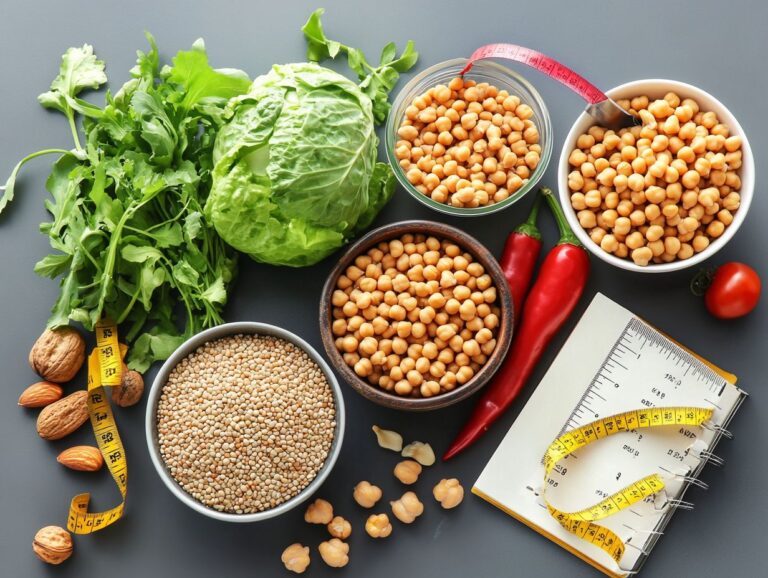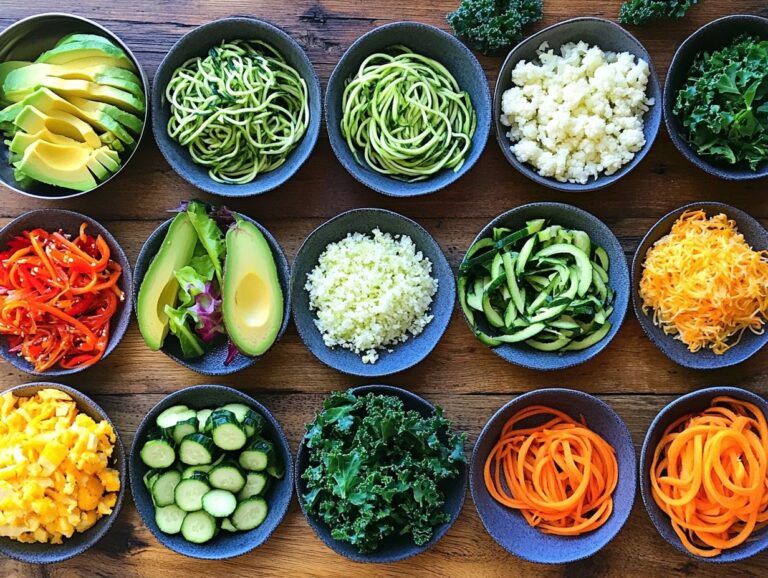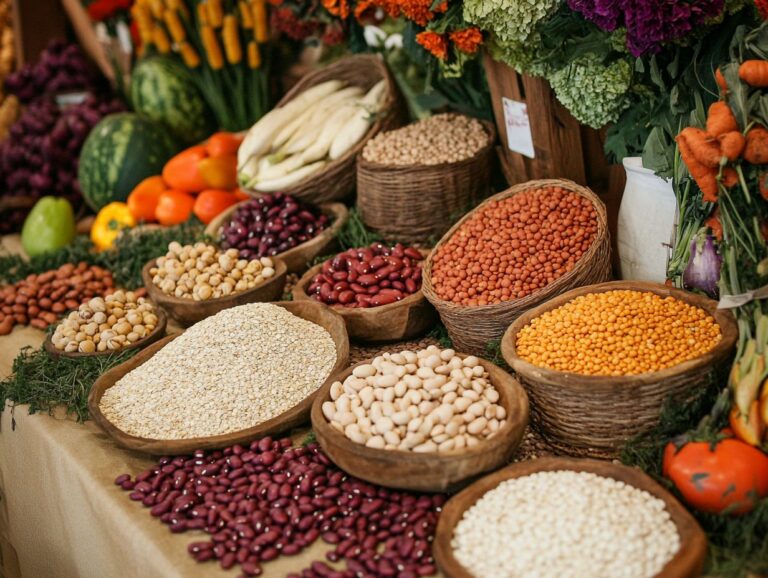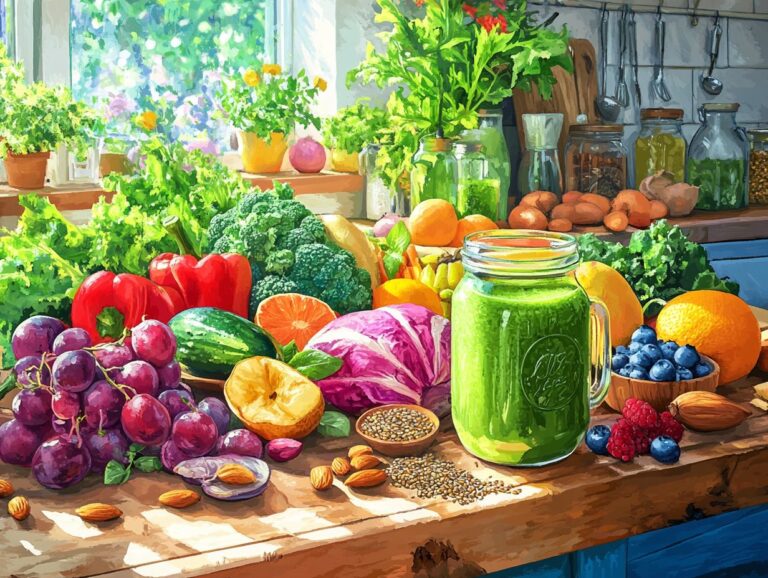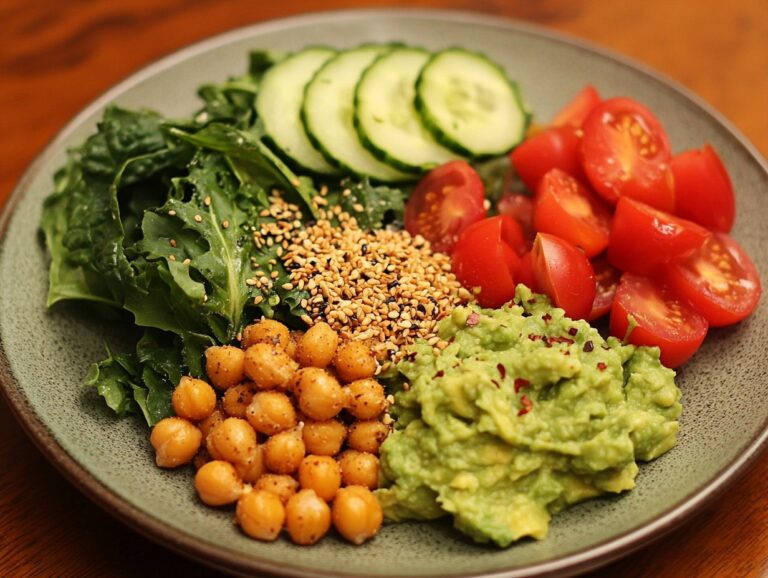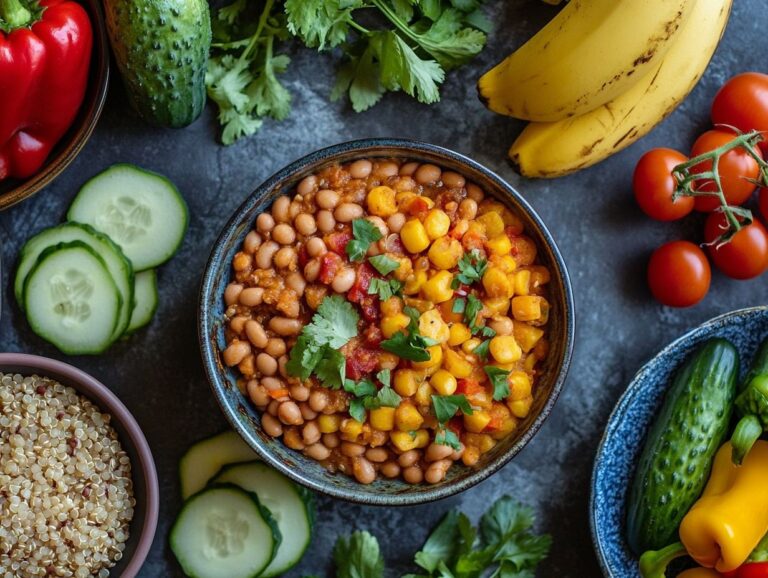Embracing a vegan diet can be a rewarding journey; however, many individuals may struggle with unexpected fatigue. It is essential to understand the root causes of this fatigue, such as nutrient deficiencies and inadequate calorie intake, to maintain optimal energy levels. This article explores practical strategies to combat fatigue while following a vegan diet, including tips for creating balanced meals, incorporating energy-boosting foods, and considering beneficial supplements. By making informed choices and adopting healthy habits, you can revitalize your energy and thrive on a plant-based lifestyle.
What Causes Fatigue on a Vegan Diet?
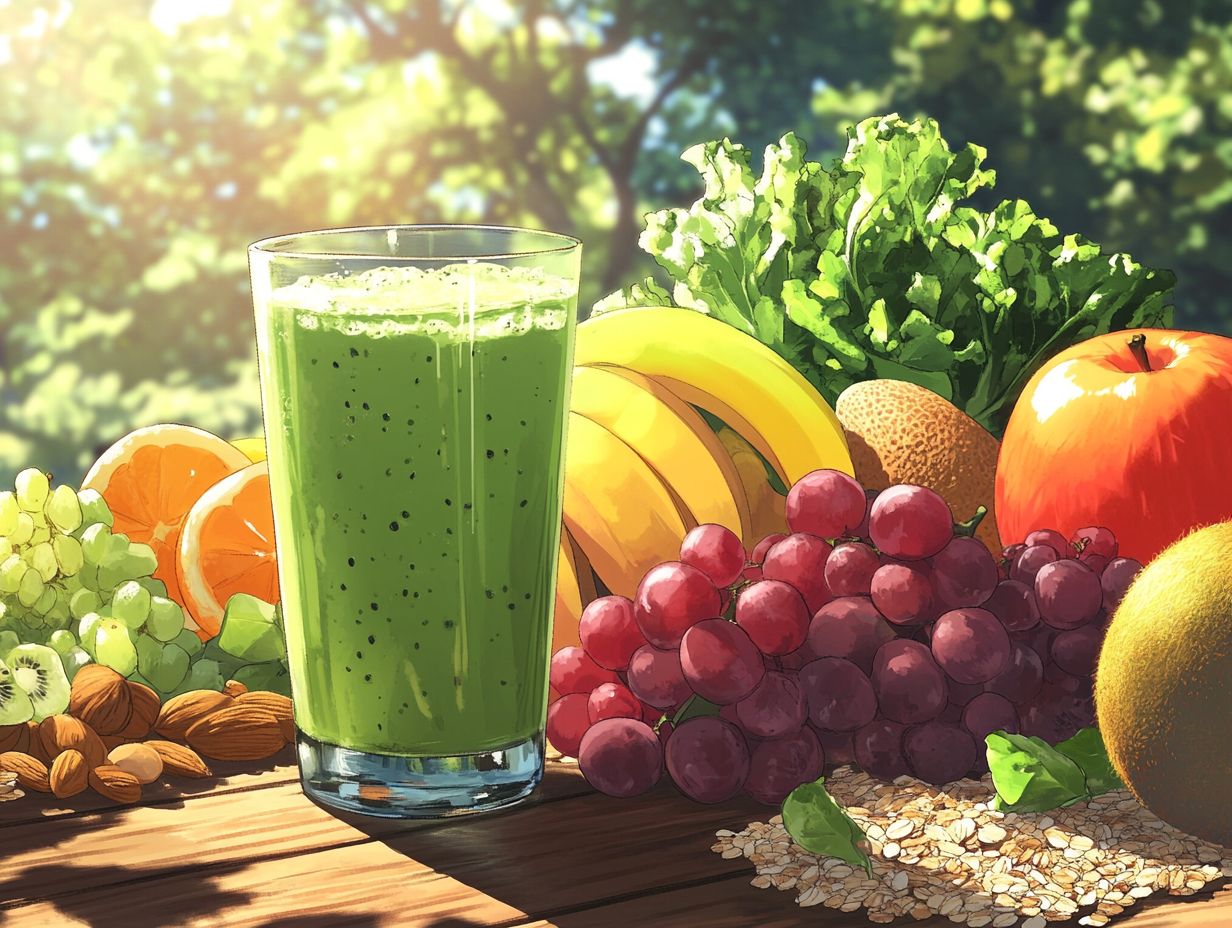
Fatigue on a vegan diet can be caused by several factors, including nutrient deficiencies, low calorie intake, food intolerances and sensitivities, blood sugar fluctuations, and psychological issues. A detailed dietary assessment can help pinpoint the exact causes of low energy and fatigue.
While a plant-based lifestyle can provide a wealth of nutrients from fruits, vegetables, whole grains, and legumes, certain deficiencies are common and can adversely affect energy levels. This is particularly true for essential nutrients such as vitamin B12, iron, and omega-3 fatty acids, which are vital for maintaining energy and overall health.
Understanding the causes of fatigue in a vegan diet is crucial for individuals following this dietary pattern, as it enables them to make informed dietary choices that promote better energy levels and overall well-being.
1. Nutrient Deficiencies
Nutrient deficiencies can significantly contribute to fatigue in a vegan diet, as this dietary approach often lacks certain vitamins and minerals essential for optimal health and energy.
For instance, vitamin B12 is crucial for the proper functioning of the nervous system and the production of red blood cells, but it is primarily found in animal products. Additionally, iron, which is responsible for carrying oxygen in the blood, can be difficult to obtain in adequate amounts from plant sources alone.
Omega-3 fatty acids, vital for brain health, the regulation of inflammation, and overall metabolism, are predominantly sourced from fish. Iodine, necessary for proper thyroid function, can be deficient unless one includes iodized salt or sea vegetables in their diet. It’s also essential to consider vitamin D and vitamin B12 supplements to support energy levels and overall health benefits.
To combat these deficiencies, it is important to consume a diverse range of nutrient-rich foods, such as:
- lentils
- beans
- nuts
- seeds
along with fortified products, smoothies, and healthy snacks ensuring that every meal is both nutrient-dense and supportive of long-term energy levels.
2. Lack of Protein
A lack of protein is another significant reason why a vegan diet can lead to fatigue. Protein is essential for energy metabolism, as well as for the repair and recovery of muscles.
When the body does not receive enough protein, it can negatively impact tissue repair and the maintenance of muscle mass, resulting in lethargy and chronic fatigue. Individuals following a plant-based diet should ensure they obtain sufficient protein by incorporating a variety of protein sources.
Legumes, such as lentils, chickpeas, and soybeans, are excellent sources of protein and also provide important dietary fiber that aids in digestion. Whole grains, including quinoa, farro, and brown rice, contribute significantly to overall protein intake as well as providing complex carbohydrates.
Additionally, insufficient protein intake throughout the day can be supplemented with plant-based protein powders made from peas or brown rice. Incorporating these foods can help ensure that both body and mind maintain energy levels throughout the day.
3. Low Iron Levels
Low iron levels are common among individuals following a vegan diet and can lead to anemia, which is associated with fatigue, reduced physical performance, and low energy. This condition often results from insufficient iron intake from plant-based sources, as iron is essential for the production of energy in the body.
Consuming foods rich in non-heme iron, such as lentils, legumes, and dark green leafy vegetables, can help raise low iron levels. Non-heme iron is a type of iron that the body can utilize, particularly when consumed alongside foods rich in vitamin C, such as citrus fruits and bell peppers. This combination significantly enhances iron absorption.
4. Inadequate Calorie Intake and Low-Sugar Options
Inadequate calorie intake is often underestimated, yet it is a common cause of fatigue among those following a vegan diet, as under-eating is linked to reduced energy levels.
To address this issue, it is essential for individuals to focus on meal planning that emphasizes a variety of nutrient-dense foods. Incorporating whole grains, fruits, and vegetables helps ensure that their diets are rich in essential vitamins, minerals, and provide an energy boost.
It is also important to balance the distribution of macronutrients—sugars, proteins, and fats—to maintain energy and stamina throughout the day. Additionally, meal prepping can prevent individuals from opting for last-minute dishes that may be low in calories, which can contribute to fatigue.
Being mindful of portion sizes and incorporating high-energy snacks, such as nuts or seeds, can further assist in maintaining energy levels and reducing feelings of tiredness.
How to Boost Your Energy on a Vegan Diet?
To boost energy on a vegan diet, it is essential to focus on a balanced intake of key nutrients, particularly iron and plant-based proteins.
This can be achieved by incorporating dense, nutrient-rich foods into one’s diet, such as leafy greens, legumes, whole grains, nuts, and seeds.
These foods supply the vitamins and minerals necessary for the body to generate energy and maintain overall health. Additionally, including organic and gluten-free options can further enhance the health benefits of a vegan diet.
1. Eat a Balanced Diet
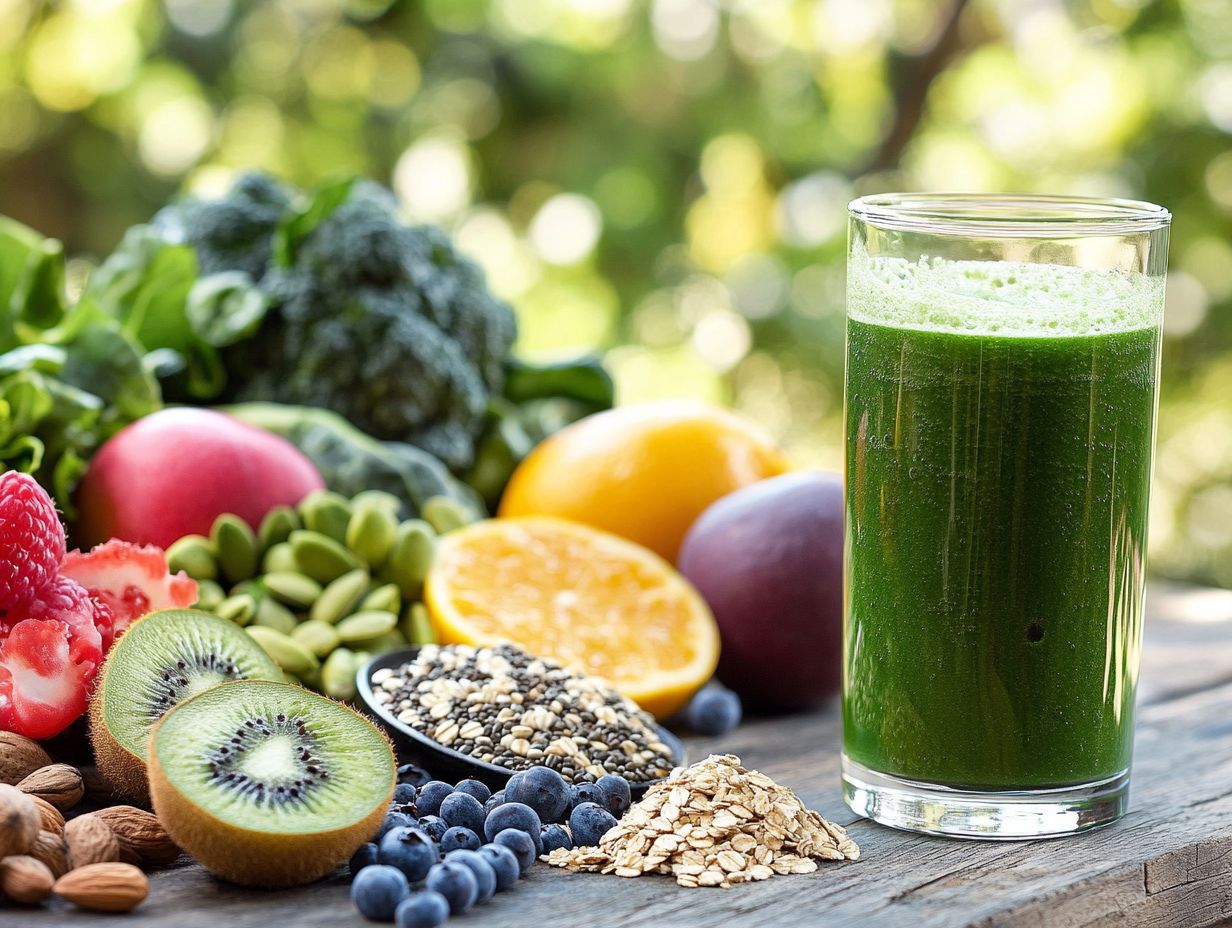
Maintaining a balanced diet is crucial for sustaining energy levels on a vegan diet, as it ensures that the body receives the necessary nutrients to function optimally. Incorporating a wide variety of food groups is essential for achieving this balance.
For instance, colorful fruits and nutrient-dense vegetables provide a diverse array of vitamins and minerals vital for overall health. Whole grains, such as quinoa and brown rice, serve as excellent sources of complex carbohydrates, delivering steady energy throughout the day.
Legumes, including beans and lentils, are rich in protein and high in fiber, both of which are important for digestive health. Superfoods like sweet potatoes and bananas provide natural sugars and complex carbohydrates for sustained energy. By planning meals that include these various food groups, individuals can create nutrient-dense dishes that promote energy and overall well-being.
2. Incorporate Iron-Rich Foods
Consuming iron-rich foods can help combat fatigue and anemia, which can drain your energy, especially on a vegan diet. Iron is an often-overlooked nutrient that is essential for everyone, particularly those following plant-based diets.
To boost your iron levels, consider incorporating the following foods into your meals:
- lentils
- chickpeas
- quinoa
- tofu
- dark leafy greens such as spinach and kale
- fortified cereals
Additionally, iron absorption can be enhanced by consuming vitamin C-rich foods, such as oranges, strawberries, or bell peppers. Combining both iron and vitamin C-rich foods allows the body to utilize iron more effectively.
3. Include Plant-Based Protein Sources
Incorporating a wide variety of plant-based protein sources is essential for sustaining energy and supporting overall health on a vegan diet. Foods such as beans, lentils, quinoa, and nuts not only aid in muscle recovery but also provide important nutrients that contribute to a balanced diet.
Beans are rich in fiber, which supports gut health and helps maintain energy levels throughout the day. Lentils serve as an excellent source of iron and folate, both of which are crucial for oxygen transport and cellular function.
Quinoa is considered a complete protein, containing all nine essential amino acids, making it an ideal choice for those looking to build and repair muscle. Additionally, nuts offer healthy fats, vitamins, and minerals that promote heart health and help keep you feeling full between meals.
4. Consume Enough Calories
Consuming enough calories is essential for preventing fatigue on a vegan diet, as a low caloric intake can result in decreased energy levels and overall vitality.
One effective strategy for ensuring adequate caloric intake is meal planning, which allows for the careful inclusion of balanced nutrients in every meal. Planning for fresh fruits, vegetables, and whole grains helps in maintaining energy levels.
Nutrient-rich snacks such as nuts, seeds, and dried fruits can help boost caloric intake throughout the day without requiring significant extra effort.
It is also important to include healthy fats like avocados, olive oil, and coconut, as they contribute considerable caloric density.
Additionally, paying attention to the body’s hunger signals can guide food choices and meal timing, fostering a more intuitive approach to eating and ensuring that daily energy needs are consistently met.
What Are the Best Foods to Fight Fatigue?
The most effective foods to combat fatigue on a vegan diet are those that are nutrient-dense and offer a substantial energy boost, helping to alleviate feelings of tiredness and low energy. Hydration also plays a critical role in maintaining energy levels, so drinking enough water is essential.
A diverse range of whole foods, including fruits, vegetables, whole grains, nuts, and seeds, provides essential vitamins, minerals, and antioxidants that enhance overall energy levels and promote well-being.
1. Leafy Greens
Leafy greens are a category of vegetables that provide numerous nutrients beneficial for reducing fatigue, especially within a vegan diet. These vegetables, which include spinach, kale, and Swiss chard, are rich in essential vitamins, minerals, and antioxidants. Additionally, incorporating these greens into meals or smoothies can greatly enhance their health benefits.
Leafy greens are particularly high in dietary iron, calcium, vitamins, and essential minerals like vitamins A, C, and K, all of which contribute to optimal health. Incorporating these nutrient-dense vegetables into one’s plant-based diet enhances the intake of vital nutrients and boosts overall energy levels. For instance, spinach is rich in iron, which aids in the transport of oxygen throughout the body; kale is packed with antioxidants that help combat oxidative stress; and Swiss chard is an excellent source of magnesium, which supports muscle function and energy production.
Regular consumption of these greens can lead to increased vitality and improved overall physical well-being, making them a staple in nutrient-dense diets.
2. Whole Grains
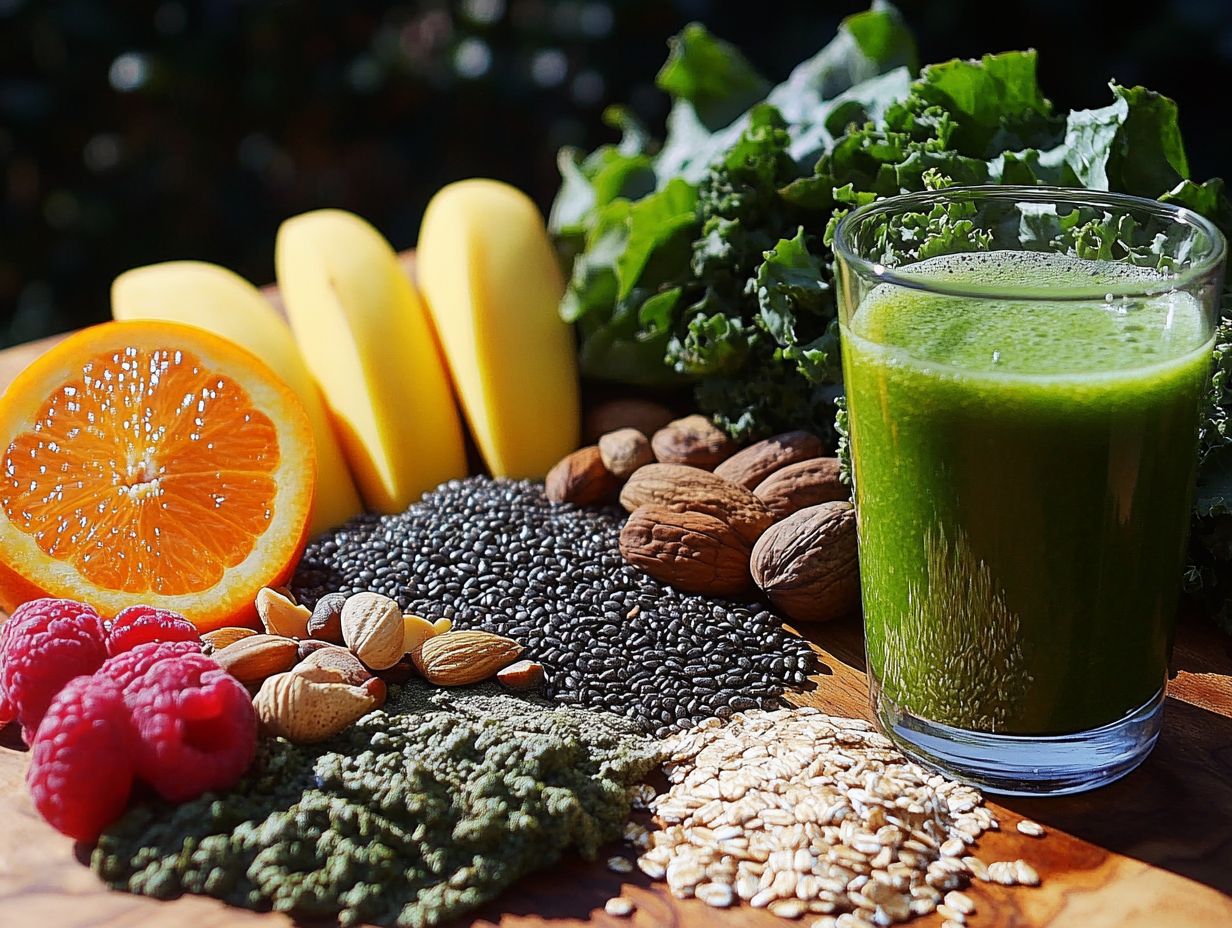
Whole grains are an excellent source of complex carbohydrates and dietary fiber, making them essential for sustained energy in a vegan diet. These nutrient-dense foods, which include quinoa, brown rice, and oats, not only provide a vital source of energy but also play a significant role in boosting metabolism.
By incorporating whole grains into their daily meals, individuals can support their energy levels throughout the day while also enjoying the benefits of improved digestion. The fiber found in these grains helps maintain a healthy gut, promotes regularity, and fosters the growth of beneficial gut bacteria.
Additionally, the slow release of energy from whole grains contributes to stabilizing blood sugar levels, preventing energy crashes and hunger pangs. Therefore, including whole grains in a balanced diet is key to achieving overall health.
3. Nuts and Seeds
Nuts and seeds are nutrient-dense foods that provide healthy fats, protein, essential vitamins, and minerals, making them an excellent choice for boosting energy on a vegan diet.
Among the most popular options are:
- Almonds, which are rich in vitamin E and magnesium,
- Chia seeds, known for their omega-3 fatty acids and high dietary fiber content,
- Flaxseeds, which stand out for their lignans, possessing antioxidant properties.
Incorporating these foods into daily meals can be simple; for example, you can sprinkle chia seeds onto smoothies or oatmeal, or use ground flaxseeds in baking recipes to enhance both texture and nutritional value.
Nuts can serve as satisfying snacks on their own or be blended into homemade nut butters, providing a delicious energy boost that keeps you feeling fuller for longer.
4. Legumes
Legumes, such as lentils, beans, and chickpeas, are a rich source of plant-based protein, complex carbohydrates, and energy, making them a staple in vegan diets.
These high-fiber foods help stabilize blood sugar levels and promote a feeling of fullness, which can be beneficial for weight management.
You can easily incorporate legumes into your daily meals by:
- Adding a scoop of black beans to a salad,
- Blending lentils into a soup, or
- Using chickpeas as the base for hummus.
What Supplements Can Help with Fatigue on a Vegan Diet?
Supplements can help alleviate fatigue associated with a vegan diet by providing nutrients that may be challenging to obtain from plant-based sources.
Essential supplements, including Vitamin B12, iron, omega-3 fatty acids, vitamin D, and iodine, can help address deficiencies in specific nutrients that contribute to fatigue and low energy levels.
1. Vitamin B12
Vitamin B12 is an essential supplement for vegans because it is one of the few nutrients that are exclusively found in animal products and is crucial for maintaining healthy energy levels and overall well-being.
A deficiency in this vitamin can lead to a range of symptoms, from fatigue and weakness to impaired mental function over time.
Vitamin B12 is vital for the production of red blood cells, which transport oxygen throughout the body, and for the proper functioning of the nervous system.
Supplementation of Vitamin B12 is particularly important for individuals following a vegan diet, as they are at a higher risk of deficiency. Maintaining adequate levels of this vitamin can help vegans enhance their energy levels, improve mental clarity, and promote overall health, as well as prevent chronic fatigue.
2. Iron
Iron supplements are beneficial for vegans, as low iron levels are a common issue that can lead to fatigue and decreased energy.
Along with preventing anemia—a condition characterized by low levels of red blood cells and hemoglobin—iron supplements play a vital role in enhancing overall vitality and general well-being.
Various types of iron supplements, such as:
- ferrous sulfate
- ferrous gluconate
- ferrous fumarate
have different advantages and disadvantages regarding absorption and gastrointestinal side effects. For adults, a daily dosage of 18 mg is typically recommended for women and 8 mg for men, although individual requirements may vary.
Carefully considering both the dosage and type of supplement can significantly enhance the benefits of iron supplementation while minimizing unwanted side effects.
3. Vitamin D
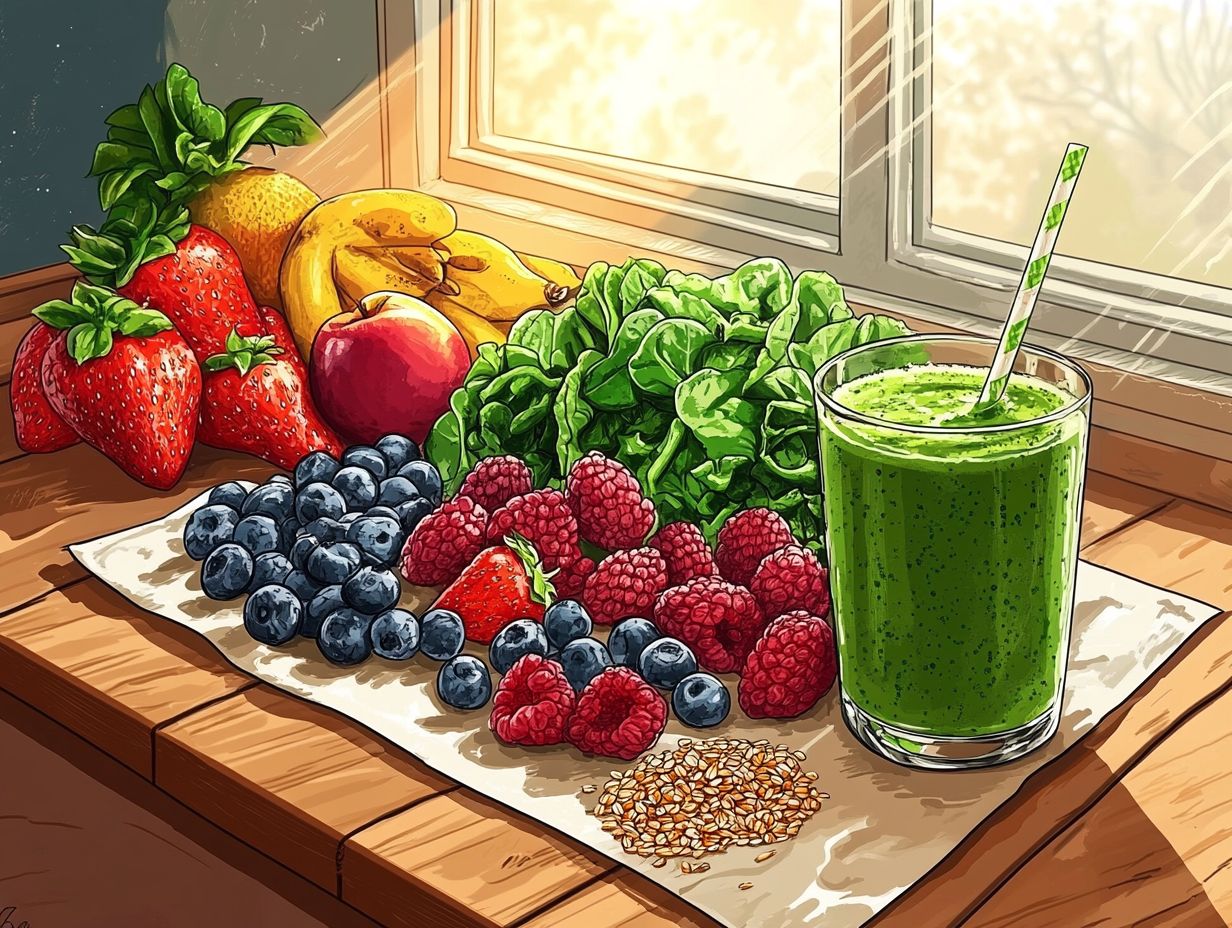
Vitamin D is an essential supplement for vegans, as it plays a crucial role in maintaining energy levels, supporting immune function, and promoting overall health.
Since the primary sources of vitamin D are found in animal products such as fish and eggs, it is important for those following a vegan diet to explore alternative ways to obtain this vital nutrient.
For many individuals, especially those living in areas with limited sunlight, the natural synthesis of vitamin D through sun exposure becomes less feasible. This is particularly true during winter months or in overcast climates, where the sun’s rays are not as strong.
Incorporating fortified foods or using supplements can help bridge this gap, ultimately aiding in combatting fatigue and enhancing overall well-being. Maintaining a healthy level of vitamin D can also support mood stability and bone health, contributing to a more balanced lifestyle.
4. Omega-3 Fatty Acids
Omega-3 fatty acids are essential for brain health and can have a significant positive impact on vegans, as they are primarily found in fish and are less prevalent in a plant-based diet.
These vital nutrients are crucial for maintaining proper cognitive function, improving mood, and enhancing memory. Omega-3 fatty acids also help sustain energy levels, allowing individuals to feel more energized throughout the day.
Known for their anti-inflammatory properties, omega-3s can help alleviate various health conditions related to inflammation. For vegans, it is particularly important to seek alternative sources of these fatty acids.
Plant-based foods such as flaxseeds, chia seeds, and walnuts can be beneficial; however, for direct absorption of omega-3s similar to that obtained from fatty fish, alternative supplements like algae oil serve as an excellent source that complements a plant-based diet.
How to Incorporate More Energy-Boosting Habits into Your Daily Routine?
Incorporating energy-boosting habits into your daily routine can improve your mood and reduce fatigue, particularly on a vegan diet.
Holistic lifestyle practices, such as ensuring adequate sleep, staying properly hydrated, engaging in regular exercise, and effectively managing stress levels, can enhance energy levels and overall well-being.
1. Get Enough Sleep
Sleep is essential for combating fatigue and boosting energy levels, particularly for those following a vegan diet. It plays a vital role in overall health, influencing mental clarity, physical well-being, and various other aspects of wellness.
For individuals on a plant-based diet, quality sleep can enhance nutrient absorption and metabolism, further supporting their dietary choices. Maintaining a consistent sleep schedule by going to bed and waking up at the same time each day, establishing a calming bedtime routine, and reducing screen time before sleep can all contribute to better sleep quality.
Sleep is not only important for increasing daytime energy levels but also for helping the body recover from daily activities. This recovery is crucial for everyone, but especially for those relying more heavily on plant-based proteins and nutrients for their overall health.
2. Stay Hydrated
Adequate hydration is essential for maintaining optimal energy levels and can help prevent fatigue on a vegan diet, which is often overlooked. Proper hydration supports the functions of various bodily systems, including digestion and nutrient absorption, both of which are vital for sustaining stamina throughout the day.
For individuals following a vegan diet, it is important to be mindful of liquid intake, as some plant-based foods may not provide sufficient hydration on their own.
To increase water intake, consider carrying a reusable water bottle, setting reminders to drink water regularly, or infusing water with fruits or herbs to enhance its flavor.
Additionally, incorporating hydrating foods such as cucumbers, watermelon, and leafy greens into meals is crucial, as they can significantly contribute to overall fluid intake, complementing a well-balanced, nutrient-dense diet.
3. Exercise Regularly
Exercise is one of the most effective ways to increase energy levels and reduce fatigue, which is particularly important for those following a vegan diet.
Engaging in regular exercise boosts metabolism, enabling the body to utilize nutrients more efficiently—a key factor for individuals on a plant-based diet. It also helps combat inflammation, promoting better health outcomes.
Simple activities like brisk walking, cycling, or yoga can enhance blood circulation and increase the oxygen supply to muscles, thereby improving endurance. Additionally, these exercises help elevate mood through the release of endorphins, which further contributes to overall energy levels, making it a vital part of any lifestyle aimed at maintaining energy and reducing chronic fatigue.
Swimming and dancing are also enjoyable options for maintaining energy levels throughout the day, especially on a plant-based diet where nutrient-rich foods like fruits, vegetables, and whole grains play a vital role.
4. Manage Stress Levels and Nutrient Intake
Managing stress levels is essential for maintaining energy and combating fatigue, especially on a vegan diet, where nutrient deficiencies like Vitamin B12, Omega-3, and vitamin D can contribute to mental health challenges.
Incorporating mindfulness, meditation, and relaxation exercises can significantly enhance an individual’s ability to manage stress on a daily basis. Additionally, consuming nutrient-dense foods such as beans, lentils, and chickpeas can provide a natural energy boost.
Mindfulness helps people become more present, engaged, and aware, thereby reducing worries about the past or future. Meditation offers an opportunity for individuals to pause and reflect, fostering clarity of thought and a sense of calm, which can be enhanced by a diet rich in complex carbohydrates and dietary fiber from sources like oatmeal and sweet potatoes.
Relaxation exercises can relieve muscle tension and promote a peaceful state of mind. Together, these practices not only boost energy levels but also enhance overall mental well-being, complementing a healthy vegan lifestyle enriched with antioxidants, vitamins, minerals, and plant-protein powder for optimal health benefits.
